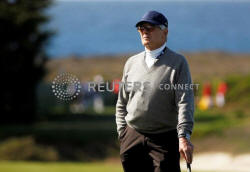Five new life lessons from Charles Schwab
 Send a link to a friend
Send a link to a friend
 [November 08, 2019] (The
writer is a Reuters contributor; the opinions expressed are his own.) [November 08, 2019] (The
writer is a Reuters contributor; the opinions expressed are his own.)
By Chris Taylor
NEW YORK(Reuters) - When Charles Schwab
stares intently at his smartphone, you can be sure of one thing: He is
checking the stock market.
The 82-year-old has been in a heated love affair with stocks and
capitalism ever since starting his brokerage back in 1971.
Schwab sat down with Reuters to talk about his latest book, "Invested,"
in which he talks about the bumpy, winding, unlikely path that landed
him where he is today.
A few key lessons he learned along the way:
1. While you’re young, get out there and work every job you can.
You might be surprised to learn some of the wacky gigs from Schwab’s
teenage years: Plucking duck feathers, raising hens, collecting Coke
bottles from under grandstands, driving a tractor at a sugar beet farm,
working as an oilfield roustabout. Those early moments taught him as
much about human nature as anything else in his career.

“Dealing with people on that level, you get a real understanding of
them,” he said. “When I was working on the beet farm alongside Hispanic
agricultural workers, they may not have been able to speak any English,
but they were real people with real families and real feelings. I’ve
been lucky to have experiences like that, and I think all parents should
get their teenagers out doing that kind of stuff.”
2. Take the risk – even if you are not totally ready.
When trading commissions were first deregulated decades ago, no one –
including Schwab himself – truly knew how a low-cost brokerage strategy
was going to play out. But he went for it, and his current $7.8 billion
net worth (according to Forbes) indicates how well that bet paid off.
His motto: “85% ready is good enough,” he says. “If you’re 85% of the
way there, then make the decision to go for it. Hesitation doesn’t do
anybody any good.”
3. Turn your weakness into advantage.
Many might not know that Schwab is dyslexic, and still reads slowly
today. Even at 82, you can tell that his childhood experience cut him to
the quick. “Dyslexia wasn’t even defined when I was a kid,” he said.
“You were either slow, or stupid. People said things like, ‘Why don’t
you do better? Just work harder!’”
[to top of second column] |

Founder and Chairman of the Charles Schwab Corp, Charles Schwab,
watches play on the 14th green during the first round of the Pebble
Beach National Pro-Am golf tournament at the Monterey Peninsula
Country Club course in Pebble Beach, California, February 6, 2014.
REUTERS/Michael Fiala/File Photo

But a remarkable number of people with learning differences, such as Virgin
Group’s Richard Branson and Apple’s Steve Jobs, turned into extraordinary
business leaders – perhaps because of that ability to look at things
differently, process events in new ways, and see things others don’t see.
4. Do the hard things.
Another of his lowest career moments: When the Schwab board let go former Chief
Executive David Pottruck. Not only because it was a delicate situation with a
longtime colleague, but because it meant Schwab himself had to reassume the
title of CEO.
“That was a really down time,” he remembered. “It felt like a fire hose of water
coming at my head, becoming a CEO again at sixtysomething.” But a public
company’s primary responsibility is to its shareholders, and even though it
wasn’t comfortable or easy, Schwab did what he felt had to be done.
5. Do not think in terms of family dynasties.
Schwab has five kids and 13 grandchildren, so you might think that he envisions
an army of next-gen Schwabs taking over the company after he’s gone. Not so.
“They have to follow their passions, whatever that might be,” he said. "If you
want to be a teacher, be a teacher. There’s no need for them to work in finance.
In fact only one of my children is in the business - my eldest daughter Carrie,
who runs our foundation. She actually started for us as a file clerk.”
For whoever ends up running the show, he hopes that this new book can be a sort
of GPS, steering them in the right direction. “I know full well that there is an
end zone out there for me someplace,” he quipped. “I wrote this so that
employees and customers would know where we came from, and understand the values
we talk about. Maybe it could be a kind of Bible going forward – for the next
chapter, after I’m gone.”
(Reporting by Chris Taylor; Editing by Beth Pinsker and Jonathan Oatis; Follow
us @ReutersMoney or at http://www.reuters.com/finance/personal-finance.)
[© 2019 Thomson Reuters. All rights
reserved.] Copyright 2019 Reuters. All rights reserved. This material may not be published,
broadcast, rewritten or redistributed.
Thompson Reuters is solely responsible for this content. |